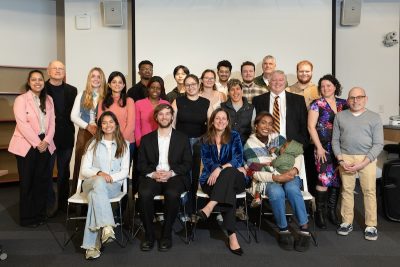Seven student-designed products, services, and technologies meant to assist people with intellectual and developmental disabilities won recognition and seed funding at the Intelligence++ Showcase on April 25, 2024.
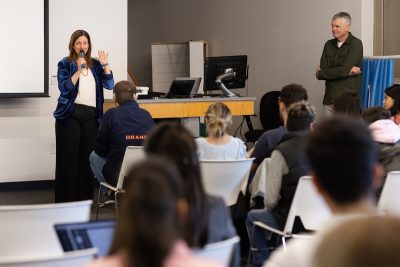
The showcase is the culmination of the two-semester Intelligence++ (DES 400/600) course taught by Don Carr, professor and Program Coordinator for Industrial and Interaction Design in the College of Visual and Performing Arts (VPA), and Beth Myers, Lawrence B. Taishoff Assistant Professor of Inclusive Education and Executive Director of the Taishoff Center in the School of Education.
The interdisciplinary course is open to undergraduate and graduate students from across the University, including students studying in the InclusiveU program. “It’s a unique program,” says Carr. “To my knowledge, Intelligence++ is the only integrated design and innovation incubator in which students from a program such as InclusiveU work as part of a team to develop a wide range of product ideas.”
As part of the course, students learn about steps taken at the University to help address accessibility and neurodiversity across campus. Myers says the fact that students come from a range of majors and programs helps widen the understanding of access, disability, and inclusion needs and abilities.
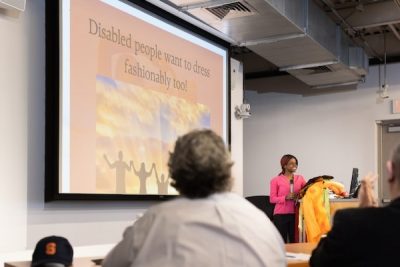
“We’re thinking about disability, accessibility, and disability language and content, as well as the possibilities [for] disability and neurodiversity. We’re designing not for disabled people, but with disabled people, so it’s really meaningful,” says Myers.
Shelstie Dastinot ’24, a fashion design major in VPA, says her perspective on disability is formed by personal experience. “I realized that we all separate ourselves from the disabled community, but we can all become disabled at any point. We are all temporarily able, is what I like to say.”
Ryan Brouchoud ’25, a policy studies major in the Maxwell School of Citizenship and Public Affairs, says the class taught him how to think in practical and functional ways about disability needs. “I’m learning about the best way to go about making products and programs that are accessible to all but that are also feasible to create. I’m interested in creating something that fixes problems that need addressing.”
Xiaochao Yu ’25, an interior design major in VPA, spoke to both disabled and non-disabled individuals as he worked on his project, and found the groups had similar concerns regarding public study spaces. “They expressed that the environment was distracting both visually and acoustically. I decided to create a product that would provide the privacy students were looking for.”
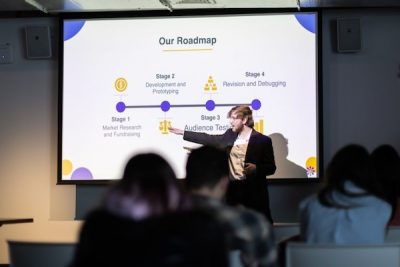
His project, Portable Sensory Enclosure, uses low-budget structural elements and materials to create temporary, movable barriers that offer more privacy and acoustic and visual improvements for use in public study areas.
The other winning projects were:
- Uplift U, a website that allows reporting on barriers to accessibility, such as the lack of an access ramp at a building, and issues and incidents related to diversity and inclusion, such as a bias situation. It was created by InclusiveU students Tanner Knox Belge ’27 an undeclared major; Devin Braun ’27, a food studies major; Sean Bleaking ’24, a food studies major; and Arturo Tomas Cruz Avellan ’27, an undeclared major, along with Jasmine Rood ’27, a design studies major in VPA, Caitlin Kennedy Espiritu ’25, a public communications major in the Newhouse School of Public Communications, and Megan Gajewski ’27, a fashion design major in VPA.
- Cuse Up, an app to help InclusiveU students more easily discover social groups and campus activities, created by students Tojyea Matally ’27, a communication design major, and Faith Mahoney ’26, an industrial and interaction design major, both studying in VPA.
-
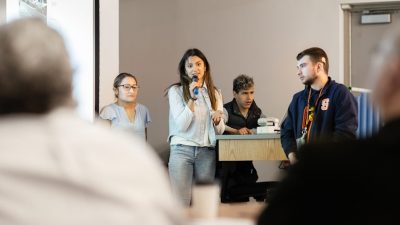
Four members of the team of UpliftU present how their website makes reporting incidents of bias and accessibility barriers easier, with a built-in feedback and assessment system. Shelstie, a line of sustainable, adaptive clothing featuring bright colors and Haitian-inspired looks, designed by Dastinot.
- AdaptEd, an educational tech platform that uses AI-powered software to support varied learning styles, created by Brouchoud and Adya Parida ’25, a computer science major in the College of Engineering and Computer Science.
- Echo Classroom, a platform that provides resources to aid in lesson interpretation, developed by Alexandra Gustave ’24 and Charlotte Chu ’26, fashion design majors in VPA.
- VocaLink, a computer-based vocational training and interactive learning tool, developed by graduate students Dhruv Shah ’25 and Sampada Regmi ’24, who are both students in the applied data science program at the School of Information Studies.
Judges were Matthew Van Ryn, a Syracuse attorney; Hanah Ehrenreich, a development associate at Jowonio School who also advises entrepreneurs; Brianna Howard ’20, G’21, founder of Faithful Works virtual assistant and grant writing services; and Gianfranco Zaccai ’70, H’09, co-founder and chief designer of Continuum Innovation, who founded Intelligence++ through his Zaccai Foundation for Augmented Intelligence.
